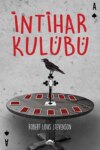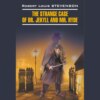Kitabı oku: «New Arabian Nights», sayfa 11
“You are old,” said the Prince; “but years are disgraceful to the wicked. Your age is more unwise than the youth of others. Do not provoke me, or you may find me harder than you dream. This is the first time that I have fallen across your path in anger; take care that it be the last.”
With these words, motioning the clergyman to follow, Florizel left the apartment and directed his steps towards the garden gate; and the Dictator, following with a candle, gave them light, and once more undid the elaborate fastenings with which he sought to protect himself from intrusion.
“Your daughter is no longer present,” said the Prince, turning on the threshold. “Let me tell you that I understand your threats; and you have only to lift your hand to bring upon yourself sudden and irremediable ruin.”
The Dictator made no reply; but as the Prince turned his back upon him in the lamplight he made a gesture full of menace and insane fury; and the next moment, slipping round a corner, he was running at full speed for the nearest cab-stand.
(Here, says my Arabian, the thread of events is finally diverted from The House with the Green Blinds. One more adventure, he adds, and we have done with The Rajah’s Diamond. That last link in the chain is known among the inhabitants of Bagdad by the name of The Adventure of Prince Florizel and a Detective.)
THE ADVENTURE OF PRINCE FLORIZEL AND A DETECTIVE
Prince Florizel walked with Mr. Rolles to the door of a small hotel where the latter resided. They spoke much together, and the clergyman was more than once affected to tears by the mingled severity and tenderness of Florizel’s reproaches.
“I have made ruin of my life,” he said at last. “Help me; tell me what I am to do; I have, alas! neither the virtues of a priest nor the dexterity of a rogue.”
“Now that you are humbled,” said the Prince, “I command no longer; the repentant have to do with God and not with princes. But if you will let me advise you, go to Australia as a colonist, seek menial labour in the open air, and try to forget that you have ever been a clergyman, or that you ever set eyes on that accursed stone.”
“Accurst indeed!” replied Mr. Rolles. “Where is it now? What further hurt is it not working for mankind?”
“It will do no more evil,” returned the Prince. “It is here in my pocket. And this,” he added kindly, “will show that I place some faith in your penitence, young as it is.”
“Suffer me to touch your hand,” pleaded Mr. Rolles.
“No,” replied Prince Florizel, “not yet.”
The tone in which he uttered these last words was eloquent in the ears of the young clergyman; and for some minutes after the Prince had turned away he stood on the threshold following with his eyes the retreating figure and invoking the blessing of heaven upon a man so excellent in counsel.
For several hours the Prince walked alone in unfrequented streets. His mind was full of concern; what to do with the diamond, whether to return it to its owner, whom he judged unworthy of this rare possession, or to take some sweeping and courageous measure and put it out of the reach of all mankind at once and for ever, was a problem too grave to be decided in a moment. The manner in which it had come into his hands appeared manifestly providential; and as he took out the jewel and looked at it under the street lamps, its size and surprising brilliancy inclined him more and more to think of it as of an unmixed and dangerous evil for the world.
“God help me!” he thought; “if I look at it much oftener, I shall begin to grow covetous myself.”
At last, though still uncertain in his mind, he turned his steps towards the small but elegant mansion on the river-side which had belonged for centuries to his royal family. The arms of Bohemia are deeply graved over the door and upon the tall chimneys; passengers have a look into a green court set with the most costly flowers, and a stork, the only one in Paris, perches on the gable all day long and keeps a crowd before the house. Grave servants are seen passing to and fro within; and from time to time the great gate is thrown open and a carriage rolls below the arch. For many reasons this residence was especially dear to the heart of Prince Florizel; he never drew near to it without enjoying that sentiment of home-coming so rare in the lives of the great; and on the present evening he beheld its tall roof and mildly illuminated windows with unfeigned relief and satisfaction.
As he was approaching the postern door by which he always entered when alone, a man stepped forth from the shadow and presented himself with an obeisance in the Prince’s path.
“I have the honour of addressing Prince Florizel of Bohemia?” said he.
“Such is my title,” replied the Prince. “What do you want with me?”
“I am,” said the man, “a detective, and I have to present your Highness with this billet from the Prefect of Police.”
The Prince took the letter and glanced it through by the light of the street lamp. It was highly apologetic, but requested him to follow the bearer to the Prefecture without delay.
“In short,” said Florizel, “I am arrested.”
“Your Highness,” replied the officer, “nothing, I am certain, could be further from the intention of the Prefect. You will observe that he has not granted a warrant. It is mere formality, or call it, if you prefer, an obligation that your Highness lays on the authorities.”
“At the same time,” asked the Prince, “if I were to refuse to follow you?”
“I will not conceal from your Highness that a considerable discretion has been granted me,” replied the detective with a bow.
“Upon my word,” cried Florizel, “your effrontery astounds me! Yourself, as an agent, I must pardon; but your superiors shall dearly smart for their misconduct. What, have you any idea, is the cause of this impolitic and unconstitutional act? You will observe that I have as yet neither refused nor consented, and much may depend on your prompt and ingenuous answer. Let me remind you, officer, that this is an affair of some gravity.”
“Your Highness,” said the detective humbly, “General Vandeleur and his brother have had the incredible presumption to accuse you of theft. The famous diamond, they declare, is in your hands. A word from you in denial will most amply satisfy the Prefect; nay, I go farther: if your Highness would so far honour a subaltern as to declare his ignorance of the matter even to myself, I should ask permission to retire upon the spot.”
Florizel, up to the last moment, had regarded his adventure in the light of a trifle, only serious upon international considerations. At the name of Vandeleur the horrible truth broke upon him in a moment; he was not only arrested, but he was guilty. This was not only an annoying incident – it was a peril to his honour. What was he to say? What was he to do? The Rajah’s Diamond was indeed an accursed stone; and it seemed as if he were to be the last victim to its influence.
One thing was certain. He could not give the required assurance to the detective. He must gain time.
His hesitation had not lasted a second.
“Be it so,” said he, “let us walk together to the Prefecture.”
The man once more bowed, and proceeded to follow Florizel at a respectful distance in the rear.
“Approach,” said the Prince. “I am in a humour to talk, and, if I mistake not, now I look at you again, this is not the first time that we have met.”
“I count it an honour,” replied the officer, “that your Highness should recollect my face. It is eight years since I had the pleasure of an interview.”
“To remember faces,” returned Florizel, “is as much a part of my profession as it is of yours. Indeed, rightly looked upon, a Prince and a detective serve in the same corps. We are both combatants against crime; only mine is the more lucrative and yours the more dangerous rank, and there is a sense in which both may be made equally honourable to a good man. I had rather, strange as you may think it, be a detective of character and parts than a weak and ignoble sovereign.”
The officer was overwhelmed.
“Your Highness returns good for evil,” said he. “To an act of presumption he replies by the most amiable condescension.”
“How do you know,” replied Florizel, “that I am not seeking to corrupt you?”
“Heaven preserve me from the temptation!” cried the detective.
“I applaud your answer,” returned the Prince. “It is that of a wise and honest man. The world is a great place and stocked with wealth and beauty, and there is no limit to the rewards that may be offered. Such an one who would refuse a million of money may sell his honour for an empire or the love of a woman; and I myself, who speak to you, have seen occasions so tempting, provocations so irresistible to the strength of human virtue, that I have been glad to tread in your steps and recommend myself to the grace of God. It is thus, thanks to that modest and becoming habit alone,” he added, “that you and I can walk this town together with untarnished hearts.”
“I had always heard that you were brave,” replied the officer, “but I was not aware that you were wise and pious. You speak the truth, and you speak it with an accent that moves me to the heart. This world is indeed a place of trial.”
“We are now,” said Florizel, “in the middle of the bridge. Lean your elbows on the parapet and look over. As the water rushing below, so the passions and complications of life carry away the honesty of weak men. Let me tell you a story.”
“I receive your Highness’s commands,” replied the man.
And, imitating the Prince, he leaned against the parapet, and disposed himself to listen. The city was already sunk in slumber; had it not been for the infinity of lights and the outline of buildings on the starry sky, they might have been alone beside some country river.
“An officer,” began Prince Florizel, “a man of courage and conduct, who had already risen by merit to an eminent rank, and won not only admiration but respect, visited, in an unfortunate hour for his peace of mind, the collections of an Indian Prince. Here he beheld a diamond so extraordinary for size and beauty that from that instant he had only one desire in life: honour, reputation, friendship, the love of country, he was ready to sacrifice all for this lump of sparkling crystal. For three years he served this semi-barbarian potentate as Jacob served Laban; he falsified frontiers, he connived at murders, he unjustly condemned and executed a brother-officer who had the misfortune to displease the Rajah by some honest freedoms; lastly, at a time of great danger to his native land, he betrayed a body of his fellow-soldiers, and suffered them to be defeated and massacred by thousands. In the end, he had amassed a magnificent fortune, and brought home with him the coveted diamond.
“Years passed,” continued the Prince, “and at length the diamond is accidentally lost. It falls into the hands of a simple and laborious youth, a student, a minister of God, just entering on a career of usefulness and even distinction. Upon him also the spell is cast; he deserts everything, his holy calling, his studies, and flees with the gem into a foreign country. The officer has a brother, an astute, daring, unscrupulous man, who learns the clergyman’s secret. What does he do? Tell his brother, inform the police? No; upon this man also the Satanic charm has fallen; he must have the stone for himself. At the risk of murder, he drugs the young priest and seizes the prey. And now, by an accident which is not important to my moral, the jewel passes out of his custody into that of another, who, terrified at what he sees, gives it into the keeping of a man in high station and above reproach.
“The officer’s name is Thomas Vandeleur,” continued Florizel. “The stone is called the Rajah’s Diamond. And” – suddenly opening his hand – “you behold it here before your eyes.”
The officer started back with a cry.
“We have spoken of corruption,” said the Prince. “To me this nugget of bright crystal is as loathsome as though it were crawling with the worms of death; it is as shocking as though it were compacted out of innocent blood. I see it here in my hand, and I know it is shining with hell-fire. I have told you but a hundredth part of its story; what passed in former ages, to what crimes and treacheries it incited men of yore, the imagination trembles to conceive; for years and years it has faithfully served the powers of hell; enough, I say, of blood, enough of disgrace, enough of broken lives and friendships; all things come to an end, the evil like the good; pestilence as well as beautiful music; and as for this diamond, God forgive me if I do wrong, but its empire ends to-night.”
The Prince made a sudden movement with his hand, and the jewel, describing an arc of light, dived with a splash into the flowing river.
“Amen,” said Florizel with gravity. “I have slain a cockatrice!”
“God pardon me!” cried the detective. “What have you done? I am a ruined man.”
“I think,” returned the Prince with a smile, “that many well-to-do people in this city might envy you your ruin.”
“Alas! your Highness!” said the officer, “and you corrupt me after all?”
“It seems there was no help for it,” replied Florizel. “And now let us go forward to the Prefecture.”
Not long after, the marriage of Francis Scrymgeour and Miss Vandeleur was celebrated in great privacy; and the Prince acted on that occasion as groomsman. The two Vandeleurs surprised some rumour of what had happened to the diamond; and their vast diving operations on the River Seine are the wonder and amusement of the idle. It is true that through some miscalculation they have chosen the wrong branch of the river. As for the Prince, that sublime person, having now served his turn, may go, along with the Arabian Author, topsy-turvy into space. But if the reader insists on more specific information, I am happy to say that a recent revolution hurled him from the throne of Bohemia, in consequence of his continued absence and edifying neglect of public business; and that his Highness now keeps a cigar store in Rupert Street, much frequented by other foreign refugees. I go there from time to time to smoke and have a chat, and find him as great a creature as in the days of his prosperity; he has an Olympian air behind the counter; and although a sedentary life is beginning to tell upon his waistcoat, he is probably, take him for all in all, the handsomest tobacconist in London.
THE PAVILION ON THE LINKS
CHAPTER I
TELLS HOW I CAMPED IN GRADEN SEA-WOOD, AND BEHELD A LIGHT IN THE PAVILION
I was a great solitary when I was young. I made it my pride to keep aloof and suffice for my own entertainment; and I may say that I had neither friends nor acquaintances until I met that friend who became my wife and the mother of my children. With one man only was I on private terms; this was R. Northmour, Esquire, of Graden Easter, in Scotland. We had met at college; and though there was not much liking between us, nor even much intimacy, we were so nearly of a humour that we could associate with ease to both. Misanthropes, we believed ourselves to be; but I have thought since that we were only sulky fellows. It was scarcely a companionship, but a coexistence in unsociability. Northmour’s exceptional violence of temper made it no easy affair for him to keep the peace with any one but me; and as he respected my silent ways, and let me come and go as I pleased, I could tolerate his presence without concern. I think we called each other friends.
When Northmour took his degree and I decided to leave the university without one, he invited me on a long visit to Graden Easter; and it was thus that I first became acquainted with the scene of my adventures. The mansion-house of Graden stood in a bleak stretch of country some three miles from the shore of the German Ocean. It was as large as a barrack; and as it had been built of a soft stone, liable to consume in the eager air of the seaside, it was damp and draughty within and half ruinous without. It was impossible for two young men to lodge with comfort in such a dwelling. But there stood in the northern part of the estate, in a wilderness of links and blowing sand-hills, and between a plantation and the sea, a small Pavilion or Belvidere, of modern design, which was exactly suited to our wants; and in this hermitage, speaking little, reading much, and rarely associating except at meals, Northmour and I spent four tempestuous winter months. I might have stayed longer; but one March night there sprang up between us a dispute, which rendered my departure necessary. Northmour spoke hotly, I remember, and I suppose I must have made some tart rejoinder. He leaped from his chair and grappled me; I had to fight, without exaggeration, for my life; and it was only with a great effort that I mastered him, for he was near as strong in body as myself, and seemed filled with the devil. The next morning, we met on our usual terms; but I judged it more delicate to withdraw; nor did he attempt to dissuade me.
It was nine years before I revisited the neighbourhood. I travelled at that time with a tilt cart, a tent, and a cooking-stove, tramping all day beside the waggon, and at night, whenever it was possible, gipsying in a cove of the hills, or by the side of a wood. I believe I visited in this manner most of the wild and desolate regions both in England and Scotland; and, as I had neither friends nor relations, I was troubled with no correspondence, and had nothing in the nature of headquarters, unless it was the office of my solicitors, from whom I drew my income twice a year. It was a life in which I delighted; and I fully thought to have grown old upon the march, and at last died in a ditch.
It was my whole business to find desolate corners, where I could camp without the fear of interruption; and hence, being in another part of the same shire, I bethought me suddenly of the Pavilion on the Links. No thoroughfare passed within three miles of it. The nearest town, and that was but a fisher village, was at a distance of six or seven. For ten miles of length, and from a depth varying from three miles to half a mile, this belt of barren country lay along the sea. The beach, which was the natural approach, was full of quicksands. Indeed I may say there is hardly a better place of concealment in the United Kingdom. I determined to pass a week in the Sea-Wood of Graden Easter, and making a long stage, reached it about sundown on a wild September day.
The country, I have said, was mixed sand-hill and links; links being a Scottish name for sand which has ceased drifting and become more or less solidly covered with turf. The Pavilion stood on an even space; a little behind it, the wood began in a hedge of elders huddled together by the wind; in front, a few tumbled sand-hills stood between it and the sea. An outcropping of rock had formed a bastion for the sand, so that there was here a promontory in the coast-line between two shallow bays; and just beyond the tides, the rock again cropped out and formed an islet of small dimensions but strikingly designed. The quicksands were of great extent at low water, and had an infamous reputation in the country. Close in shore, between the islet and the promontory, it was said they would swallow a man in four minutes and a half; but there may have been little ground for this precision. The district was alive with rabbits, and haunted by gulls which made a continual piping about the pavilion. On summer days the outlook was bright and even gladsome; but at sundown in September, with a high wind, and a heavy surf rolling in close along the links, the place told of nothing but dead mariners and sea disaster. A ship beating to windward on the horizon, and a huge truncheon of wreck half buried in the sands at my feet, completed the innuendo of the scene.
The pavilion – it had been built by the last proprietor, Northmour’s uncle, a silly and prodigal virtuoso – presented little signs of age. It was two storeys in height, Italian in design, surrounded by a patch of garden in which nothing had prospered but a few coarse flowers; and looked, with its shuttered windows, not like a house that had been deserted, but like one that had never been tenanted by man. Northmour was plainly from home; whether, as usual, sulking in the cabin of his yacht, or in one of his fitful and extravagant appearances in the world of society, I had, of course, no means of guessing. The place had an air of solitude that daunted even a solitary like myself; the wind cried in the chimneys with a strange and wailing note; and it was with a sense of escape, as if I were going indoors, that I turned away and, driving my cart before me, entered the skirts of the wood.
The Sea-Wood of Graden had been planted to shelter the cultivated fields behind, and check the encroachments of the blowing sand. As you advanced into it from coastward, elders were succeeded by other hardy shrubs; but the timber was all stunted and bushy; it led a life of conflict; the trees were accustomed to swing there all night long in fierce winter tempests; and even in early spring, the leaves were already flying, and autumn was beginning, in this exposed plantation. Inland the ground rose into a little hill, which, along with the islet, served as a sailing mark for seamen. When the hill was open of the islet to the north, vessels must bear well to the eastward to clear Graden Ness and the Graden Bullers. In the lower ground, a streamlet ran among the trees, and, being dammed with dead leaves and clay of its own carrying, spread out every here and there, and lay in stagnant pools. One or two ruined cottages were dotted about the wood; and, according to Northmour, these were ecclesiastical foundations, and in their time had sheltered pious hermits.
I found a den, or small hollow, where there was a spring of pure water; and there, clearing away the brambles, I pitched the tent, and made a fire to cook my supper. My horse I picketed farther in the wood where there was a patch of sward. The banks of the den not only concealed the light of my fire, but sheltered me from the wind, which was cold as well as high.
The life I was leading made me both hardy and frugal. I never drank but water, and rarely ate anything more costly than oatmeal; and I required so little sleep, that, although I rose with the peep of day, I would often lie long awake in the dark or starry watches of the night. Thus in Graden Sea-Wood, although I fell thankfully asleep by eight in the evening I was awake again before eleven with a full possession of my faculties, and no sense of drowsiness or fatigue. I rose and sat by the fire, watching the trees and clouds tumultuously tossing and fleeing overhead, and hearkening to the wind and the rollers along the shore; till at length, growing weary of inaction, I quitted the den, and strolled towards the borders of the wood. A young moon, buried in mist, gave a faint illumination to my steps; and the light grew brighter as I walked forth into the links. At the same moment, the wind, smelling salt of the open ocean and carrying particles of sand, struck me with its full force, so that I had to bow my head.
When I raised it again to look about me, I was aware of a light in the pavilion. It was not stationary; but passed from one window to another, as though some one were reviewing the different apartments with a lamp or candle.
I watched it for some seconds in great surprise. When I had arrived in the afternoon the house had been plainly deserted; now it was as plainly occupied. It was my first idea that a gang of thieves might have broken in and be now ransacking Northmour’s cupboards, which were many and not ill supplied. But what should bring thieves to Graden Easter? And, again, all the shutters had been thrown open, and it would have been more in the character of such gentry to close them. I dismissed the notion, and fell back upon another. Northmour himself must have arrived, and was now airing and inspecting the pavilion.
I have said that there was no real affection between this man and me; but, had I loved him like a brother, I was then so much more in love with solitude that I should none the less have shunned his company. As it was, I turned and ran for it; and it was with genuine satisfaction that I found myself safely back beside the fire. I had escaped an acquaintance; I should have one more night in comfort. In the morning, I might either slip away before Northmour was abroad, or pay him as short a visit as I chose.
But when morning came, I thought the situation so diverting that I forgot my shyness. Northmour was at my mercy; I arranged a good practical jest, though I knew well that my neighbour was not the man to jest with in security; and, chuckling beforehand over its success, took my place among the elders at the edge of the wood, whence I could command the door of the pavilion. The shutters were all once more closed, which I remember thinking odd; and the house, with its white walls and green venetians, looked spruce and habitable in the morning light. Hour after hour passed, and still no sign of Northmour. I knew him for a sluggard in the morning; but, as it drew on towards noon, I lost my patience. To say the truth, I had promised myself to break my fast in the pavilion, and hunger began to prick me sharply. It was a pity to let the opportunity go by without some cause for mirth; but the grosser appetite prevailed, and I relinquished my jest with regret, and sallied from the wood.
The appearance of the house affected me, as I drew near, with disquietude. It seemed unchanged since last evening; and I had expected it, I scarce knew why, to wear some external signs of habitation. But no: the windows were all closely shuttered, the chimneys breathed no smoke, and the front door itself was closely padlocked. Northmour, therefore, had entered by the back; this was the natural and, indeed, the necessary conclusion; and you may judge of my surprise when, on turning the house, I found the back door similarly secured.
My mind at once reverted to the original theory of thieves; and I blamed myself sharply for my last night’s inaction. I examined all the windows on the lower storey, but none of them had been tampered with; I tried the padlocks, but they were both secure. It thus became a problem how the thieves, if thieves they were, had managed to enter the house. They must have got, I reasoned, upon the roof of the outhouse where Northmour used to keep his photographic battery; and from thence, either by the window of the study or that of my old bedroom, completed their burglarious entry.
I followed what I supposed was their example; and, getting on the roof, tried the shutters of each room. Both were secure; but I was not to be beaten; and, with a little force, one of them flew open, grazing, as it did so, the back of my hand. I remember, I put the wound to my mouth, and stood for perhaps half a minute licking it like a dog, and mechanically gazing behind me over the waste links and the sea; and, in that space of time, my eye made note of a large schooner yacht some miles to the north-east. Then I threw up the window and climbed in.
I went over the house, and nothing can express my mystification. There was no sign of disorder, but, on the contrary, the rooms were unusually clean and pleasant. I found fires laid, ready for lighting; three bedrooms prepared with a luxury quite foreign to Northmour’s habits, and with water in the ewers and the beds turned down; a table set for three in the dining-room; and an ample supply of cold meats, game, and vegetables on the pantry shelves. There were guests expected, that was plain; but why guests, when Northmour hated society? And, above all, why was the house thus stealthily prepared at dead of night? and why were the shutters closed and the doors padlocked?
I effaced all traces of my visit, and came forth from the window feeling sobered and concerned.
The schooner yacht was still in the same place; and it flashed for a moment through my mind that this might be the Red Earl bringing the owner of the pavilion and his guests. But the vessel’s head was set the other way.










